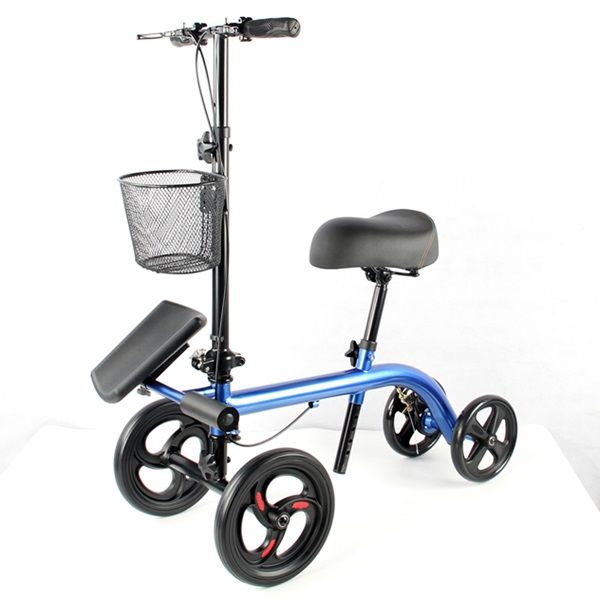Navigating Insurance and Mobility Aid Coverage

Navigating the complex world of insurance coverage for mobility aids can often feel like a daunting task. Whether you or a loved one are considering a wheelchair, rollator walker, or another type of mobility aid, understanding how your insurance can help cover these essential tools is crucial. Mobility aids are more than just equipment; they are vital for maintaining independence and improving quality of life for those with mobility challenges. However, the myriad of terms, policies, and eligibility criteria involved can obscure the clear information needed to make informed decisions.
Below we aim to demystify the insurance process surrounding mobility aids. From breaking down insurance jargon to explaining eligibility requirements and discussing potential out-of-pocket costs, we'll provide you with the essential knowledge you need. Our goal is to arm you with the information necessary to navigate these waters effectively, ensuring you or your loved ones can access the mobility aids that best suit your needs without unnecessary stress. Join us as we explore how to efficiently handle insurance coverage for mobility aids, making what can be a complex process a little easier to manage.
Decoding Insurance Coverage for Mobility Aids
When embarking on the journey to secure a mobility aid through insurance, the first step is understanding some key terms that frequently surface in policy documents and discussions with insurance representatives. Here, we'll clarify these terms to help you navigate the insurance landscape more effectively.
- Insurance Plan and Health Insurance: An insurance plan is a contract between you and your insurance provider, detailing the medical services covered and the extent of financial support. Health insurance, a type of insurance plan, specifically covers medical expenses ranging from doctor visits to medical equipment like mobility aids.
- Insurance Company and Insurance Policy: The insurance company is the entity that provides your health insurance. The terms of your coverage are detailed in an insurance policy, a legally binding document that outlines what the insurance covers, including any coverage for mobility aids such as wheelchairs or rollators.
Once you're familiar with these terms, the next step is understanding the types of mobility aids that insurance might cover. Commonly, insurance plans, whether they are private or provided by programs like Medicare, can cover a range of mobility aids. These include:
- Manual Wheelchairs: Essential for individuals who can propel themselves or who have someone available to help.
- Power Wheelchairs: Best suited for those who require assistance due to limited strength or mobility.
- Rollators: These walkers with wheels provide stability and can be crucial for those maintaining an active lifestyle.
Different insurance plans have different coverage rules for these devices. For instance, Medicare typically covers mobility aids under its Durable Medical Equipment (DME) benefit. However, coverage can depend heavily on proving the medical necessity of the aid, which must be documented by your healthcare provider.
Navigating through the coverage specifics can be challenging. It's essential to read your insurance plan documents carefully to understand the details of what is covered and under what conditions. Sometimes, even if a mobility aid is generally covered, your plan might require that you use specific suppliers or meet certain criteria to qualify for full or partial reimbursement.
Understanding these aspects of your insurance can significantly smooth the process of acquiring a mobility aid. By knowing what to expect and preparing accordingly, you can better manage the process and ensure that you receive the support your health requires.
Eligibility and Requirements for Coverage
Securing coverage for mobility aids involves more than just understanding your insurance policy; it also requires navigating the eligibility and documentation requirements. Here, we'll explore the general eligibility criteria and necessary documentation that can affect your ability to get coverage for mobility aids.
Eligibility Criteria for Insurance Coverage
Insurance policies often have specific criteria that determine eligibility for coverage of mobility aids. For Medicare beneficiaries, the requirements include a physician’s confirmation that the mobility aid is medically necessary for the patient's condition. Similar criteria apply to those seeking coverage under private insurance plans or disability benefits.
In the context of Supplemental Security Income (SSI) or other disability benefits, demonstrating a mobility disability that significantly impairs one's ability to perform daily activities can be crucial. Each insurance provider has its own set of rules, so it's important to consult with your insurance representative to understand the specific eligibility requirements of your plan.
Medical Documentation and Physician’s Prescription
A critical component in obtaining coverage for a mobility aid is the medical documentation that supports the need for such a device. This typically includes:
- A detailed prescription from your healthcare provider stating why the mobility aid is necessary.
- Medical records that document your mobility issues and how they impact your daily life.
- A possible face-to-face examination record that illustrates the specific reasons a mobility aid is recommended.
Insurance companies use this documentation to assess whether the requested mobility aid is a medical necessity as opposed to a convenience item. The clearer and more detailed the documentation, the smoother the approval process tends to be.
Role of Claims Administrators and Insurance Representatives
Understanding the role of claims administrators and insurance representatives can significantly affect your experience with insurance claims. Claims administrators are responsible for processing insurance claims and determining whether the costs incurred meet the policy terms. Meanwhile, insurance representatives can provide guidance on the specifics of your insurance coverage and help you understand the complexities of your policy.
Engaging with these professionals effectively requires clear communication and thorough preparation. Be ready to provide all necessary documentation and to explain your needs comprehensively. Additionally, knowing your rights and the appeals process is vital in case your initial claim is denied.
By understanding these eligibility and documentation requirements, you are better equipped to navigate the insurance landscape. This knowledge not only helps in ensuring that you meet all the criteria, but also prepares you to advocate effectively for your needs, increasing the likelihood of receiving the support you require for your mobility aid.
Navigating Financial Aspects and Out-of-Pocket Costs
Understanding the financial implications of insurance coverage for mobility aids is crucial. Below we'll discuss potential out-of-pocket costs, financial assistance options, and strategies to minimize expenses.
Understanding Out-of-Pocket Costs
Even with insurance, there can be significant out-of-pocket costs associated with obtaining a mobility aid. These may include deductibles, co-pays, and coinsurance. Additionally, some insurance plans may only cover a portion of the cost, leaving you to pay the remainder. It’s essential to review your insurance policy’s details on coverage limits and out-of-pocket maximums to prepare financially.
Financial Assistance for Those with Limited Income
For individuals on a limited income, paying out-of-pocket costs can be daunting. However, there are several resources to help manage these expenses:
- State Medicaid Programs: These can offer coverage for mobility aids for those who qualify based on income and disability status.
- Charitable Organizations and Nonprofits: Some organizations provide grants or donations of mobility aids to those in need.
- Manufacturer Assistance Programs: Some mobility aid manufacturers offer financial assistance or payment plans to help make their products more affordable.
Investigating these options can provide significant financial relief and make a crucial difference in affording the right mobility aid.
Minimizing Costs Through Strategic Choices
There are several strategies to minimize the financial burden of acquiring a mobility aid:
- Choosing the Right Insurance Plan: During enrollment periods, review and compare insurance plans to find one that offers better coverage for mobility aids.
- Utilizing Preferred Providers: Some insurance plans have agreements with specific providers that can offer lower costs than others. Make sure to purchase your mobility aid through these channels if possible.
- Negotiating with Providers: Don't hesitate to negotiate prices with mobility aid providers. Some may offer discounts or match lower prices found elsewhere.
Additionally, always communicate openly with your insurance representative about your financial concerns. They can help you understand what costs you can expect and guide you towards options that may reduce your expenses.
By carefully managing the financial aspects of mobility aid insurance coverage, you can make more informed decisions that align with your healthcare needs and financial situation. This proactive approach not only helps in managing costs, but also ensures that you or your loved ones can access necessary mobility aids without undue financial strain.
EZ Walker Rollators: Your Partner in Mobility and Independence
After understanding the intricacies of insurance coverage and the financial considerations for mobility aids, it's time to introduce a reliable partner who can help streamline this process: EZ Walker Rollators. As specialists in mobility aids, we are dedicated to helping you navigate the challenges of insurance coverage while providing high-quality mobility solutions tailored to your needs.
Expertise and Commitment
EZ Walker Rollators brings a wealth of knowledge and experience to the table, with a deep understanding of both the products they offer and the insurance landscape. Our team is trained to assist customers in selecting the right mobility aids, such as wheelchairs, knee scooters, and rollator walkers, ensuring that each product aligns perfectly with the medical needs and lifestyle preferences of our clients.
Wide Range of Products
Our product line at EZ Walker Rollators is carefully curated to meet diverse needs and preferences. Whether you require a manual wheelchair for occasional use or a more advanced power wheelchair for daily mobility, we have options to suit your specific conditions. Each product is designed with the user's independence and quality of life in mind, featuring the latest innovations in comfort, durability, and ease of use.
Navigating Insurance with Ease
Understanding that dealing with insurance can often be a complex and frustrating process, EZ Walker Rollators offers personalized support to help our customers. Our team provides detailed technical assistance and we strive to make this journey as smooth as possible by:
- Guiding you through the documentation needed to ensure your insurance claim is processed efficiently.
- Offering advice on how to communicate effectively with insurance representatives to maximize your coverage benefits.
Beyond the Product: A Partnership for Better Mobility
Choosing EZ Walker Rollators means more than just purchasing a mobility aid; it's about forming a partnership that supports your journey to greater independence. Our commitment extends beyond the sale, with follow-up services to ensure satisfaction and adapt to any changing needs you may have.
By partnering with EZ Walker Rollators, you gain access to not only top-quality mobility aids, but also a team of experts who are dedicated to your mobility and independence. Let us help you simplify the complex process of insurance and mobility aid acquisition, so you can focus on what matters most—living life to the fullest. Take the next step towards enhanced mobility and independence by contacting us today.




